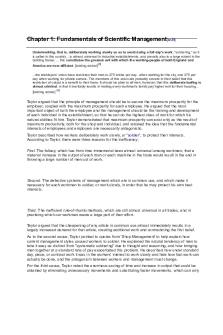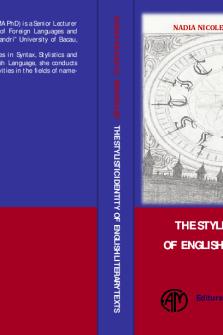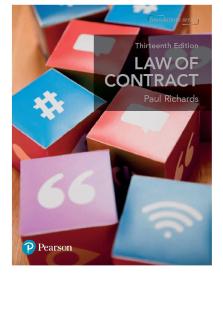The Principles of Literary Criticism-I. A. Richards DOCX

| Title | The Principles of Literary Criticism-I. A. Richards |
|---|---|
| Author | Jose V Valdez |
| Pages | 4 |
| File Size | 119.6 KB |
| File Type | DOCX |
| Total Downloads | 44 |
| Total Views | 302 |
Summary
Language 303 Philosophy of Literature The Principles of Literary Criticism-I.A. Richards September 7, 2019 Republic of the Philippines Commission on Higher Education Benguet State University College of Arts and Sciences Reporter: JOSE V. VALDEZ Subject: LANG 303 Philosophy of Literature Professor: C...
Description
Language 303 Philosophy of Literature The Principles of Literary Criticism-I.A. Richards September 7, 2019 Republic of the Philippines Commission on Higher Education Benguet State University College of Arts and Sciences Reporter: JOSE V. VALDEZ Subject: LANG 303 Philosophy of Literature Professor: CYNTHIA T. LUBITON, PhD Topic: The Principles of Literary Criticism of I.A. Richards I. Introduction A. Ivor Armstrong Richards (1893-1979) Ivor Armstrong Richards was born in Sandbach, England, on February 26, 1893. He received his formal education at Magdalene College of Cambridge University, where he received the degree of M.A. He became a teaching Fellow of Magdalene in 1926 and has also held positions as visiting professor at Tsing Hua University, Peking, from 1929 to 1930, visiting lecturer at Harvard in 1931, and Director of The Orthological Institute of China from 1936 to 1938. Throughout his life, he has been vitally interested in the Orient. While teaching in China, he studied Chinese philosophy and worked on his book MENCIUS ON THE MIND. He has had a special interest in the thought of Confucius. In 1964 he was made an Honorary Fellow of Magdalene College. B. I.A. Richards as a Critic I.A. Richards influenced both sides of the Atlantic (Europe and America) with his valuable works in literature. He is considered one of the pioneers of New Criticism. As an iconoclast he denounced the old criticism where critics were supposed to follow a set of rules and regulations. According to him Criticism is not mere application of set of rules and intuition. He is widely read not only in literature but also in philosophy, psychology, aesthetics, the fine arts and the broad principles of the various sciences. Some critics think, Coleridge is the only great critic with whom he may be compared. C. His Great Works In 1923, Richards and Ogden published THE MEANING OF MEANING, a psychologically oriented pursuit of "meaning" in the arts. But more significant critical pronouncements were made in the next three books: PRINCIPLES OF LITERARY CRITICISM in 1924, SCIENCE AND POETRY in 1926, and PRACTICAL CRITICISM in 1929. All three books treat the question of value in the arts, primarily poetry, and all are concerned with the problem of correct interpretation of art. Their aims are different, however: PRINCIPLES OF LITERARY CRITICISM spells out the theory; SCIENCE AND POETRY discusses the role and future of literature in life; and PRACTICAL CRITICISM applies theory to individual literary works. Richards' last major critical book, COLERIDGE ON IMAGINATION, published in 1935, explores several meanings of the concept of imagination and singles out Coleridge's definition as the one most accurate and applicable to twentieth century criticism. II. Discussion A. Techniques and Principles I.A. Richards was a devoted supporter of a close textual and verbal study and analysis of a work of art. His approach is pragmatic and empirical. His work is a milestone in the history of literary criticism regarding verbal and textual analysis, interpretation and evaluation. By his own work Richards has made literary criticism factual, scientific and complete. While preparing his book The Practical Criticism, he says "I have set three aims before me in constructing this book",...
Similar Free PDFs

IA Richards
- 9 Pages

Literary Analysis - Grade: A
- 2 Pages

Literary Analysis The Gathering
- 3 Pages

Educating THE Literary TASTE
- 3 Pages

Literary Analysis “The Bells”
- 1 Pages

Glossary of Literary Terms
- 23 Pages
Popular Institutions
- Tinajero National High School - Annex
- Politeknik Caltex Riau
- Yokohama City University
- SGT University
- University of Al-Qadisiyah
- Divine Word College of Vigan
- Techniek College Rotterdam
- Universidade de Santiago
- Universiti Teknologi MARA Cawangan Johor Kampus Pasir Gudang
- Poltekkes Kemenkes Yogyakarta
- Baguio City National High School
- Colegio san marcos
- preparatoria uno
- Centro de Bachillerato Tecnológico Industrial y de Servicios No. 107
- Dalian Maritime University
- Quang Trung Secondary School
- Colegio Tecnológico en Informática
- Corporación Regional de Educación Superior
- Grupo CEDVA
- Dar Al Uloom University
- Centro de Estudios Preuniversitarios de la Universidad Nacional de Ingeniería
- 上智大学
- Aakash International School, Nuna Majara
- San Felipe Neri Catholic School
- Kang Chiao International School - New Taipei City
- Misamis Occidental National High School
- Institución Educativa Escuela Normal Juan Ladrilleros
- Kolehiyo ng Pantukan
- Batanes State College
- Instituto Continental
- Sekolah Menengah Kejuruan Kesehatan Kaltara (Tarakan)
- Colegio de La Inmaculada Concepcion - Cebu









